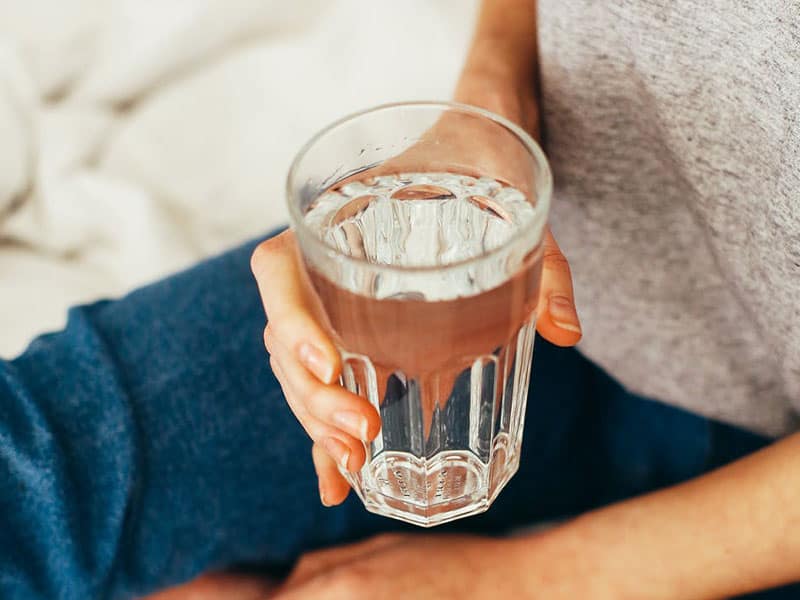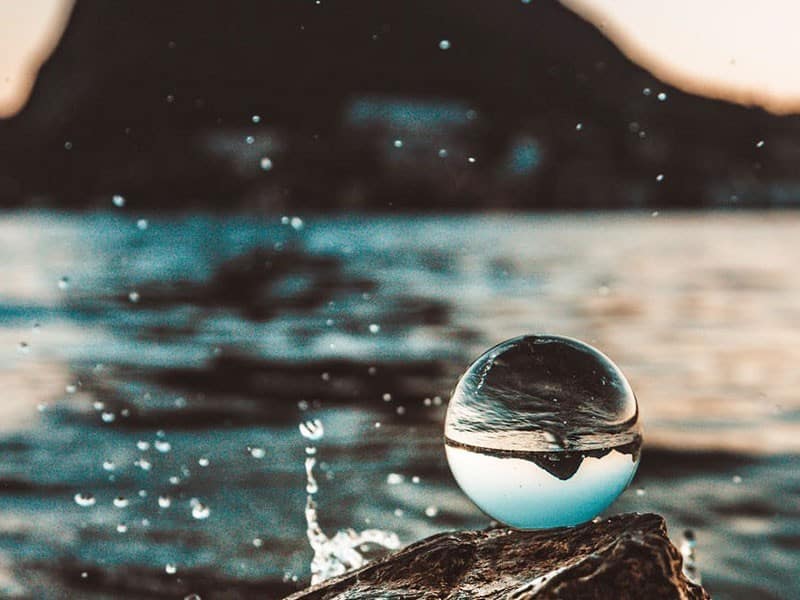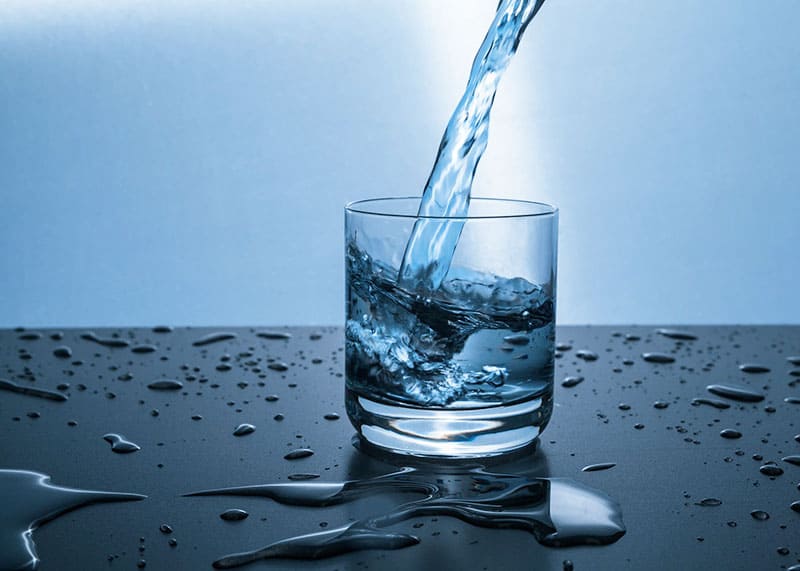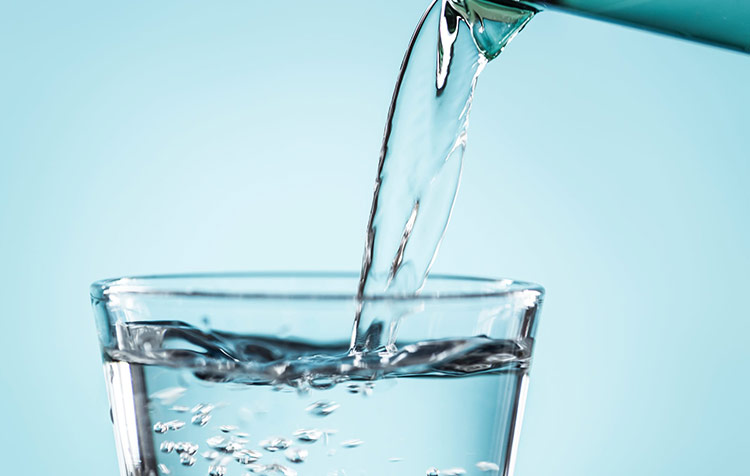What is actually Water fasting? This question is asked especially by people who initially assume a long renunciation of water. But in fact, water fasting is about taking only water for a few days to cleanse your body. In contrast to intermittent fasting and therapeutic fasting, water fasting is one of the somewhat harder methods of fasting.
In this article, I'll show you what water fasting is exactly, what you need to keep in mind, and what advantages and disadvantages it even brings.
Here is another short Table of contents for you:
What is water fasting?
Water fasting refers to a type of fasting in which you abstain from any solid foods for a specific period of time and only Drinking water.
How long should water fasting last?
As a beginner, water fasting should only be done in a Period from 3 to 5 days be carried out to exclude possible health risks. Longer periods of fasting are suitable only for experienced people who have fasted more often in the past.
How did the idea of water fasting come about?
Basically, there are 3 reasons why people follow water fasting, namely to:
- Lose weight
- detoxify the body
- to promote health
Since I don't know your state of health, I would like to point out to you once again that you should discuss your plan to take on water with your family doctor in advance.
What are the advantages of water fasting

Besides the general reasons for which people follow water fasting, there are of course clear advantages that this type of fasting brings. In the following I would like to present them to you and show why I myself have had my own experience with water fasting.
1. water fasting promotes autophagy
Autophagy describes the process of Cell renewal. In other words, your old cells are broken down and new cells are made.
Several studies have shown that autophagy can prevent diseases such as CancerAlzheimer's disease₁ and heart disease₂. In addition, autophagy is also said to increase life expectancy.
However, these studies are animal studies. Since there are currently few human studies on water fasting, the promotion of autophagy in a human body cannot be confirmed.
2. water fasting lowers blood pressure
According to a study₃, prolonged water fasting (10 days or more) is said to lower high blood pressure. In this study, 174 people with high blood pressure were examined, who 10-11 days the water fasting have followed. At the end of the study, it was found that 90% of the subjects had a lower value than at the beginning of the experiment.
However, there is no human study that has confirmed a correlation between lowered blood pressure and water fasting for a short duration (24 to 72 hours). Also, as mentioned above, as a beginner you really shouldn't fast for 10 days at a time yet.
3. insulin and leptin sensitivity is improved
Insulin and leptin are very important hormones for metabolism. Insulin helps your body, Absorb and store nutrients in the blood. Leptin produces a Sense of satiety in the body and thus inhibits the occurrence of hunger pangs.
Studies₄ show that water fasting can make your body more sensitive to leptin and insulin. Conversely, greater sensitivity means that the hormones (insulin and leptin) work more effectively, which is very beneficial.
This is because if you have a higher insulin sensitivity, your body can lower your blood sugar levels more efficiently. With a higher leptin sensitivity, a greater feeling of satiety is produced. In this way, overeating is prevented and consequently the risk of becoming overweight.
4. risk of chronic diseases is reduced
Water fasting is thought to reduce the risk of chronic diseases such as diabetes, cancer and heart disease.
In one study₅ 30 healthy subjects followed water fasting for 24 hours. After the fast, these test subjects clearly lower cholesterol and triglyceride levels determined. These two values are two risk factors for heart disease.
Several animal studies₆ show that water fasting protects the heart against free radicals. Free radicals are unstable molecules that can damage your cells. Therefore, these radicals are partly responsible for many chronic diseases. (more about this also in the article Strengthen defenses)
Furthermore, animal studies have shown that water fasting can suppress the genes that cause cancer cells to grow. Water fasting is also said to improve the effects of chemotherapy.
However, you should keep in mind that only a handful of human studies exist regarding water fasting and the current state of research needs to be further developed.
What are the disadvantages of water fasting?
Of course, water fasting can also bring disadvantages, which I will of course not withhold from you. In the following I list three possible disadvantages and risks.
1. mainly water loss
Water fasting is often associated with rapid weight loss. After all, you can lose about 2-5 kg in a few days. However, for the most part, you lose only water and not body fat.
The reason for this is that during water fasting you do not consume carbohydrates (e.g. bread, pasta, rice) and therefore your Glycogen stores emptied is used. Glycogen stores are the carbohydrates deposited in the body in the form of glycogen. It is important to know that each stored gram of glycogen stores an additional 3-4 grams of water in the body and an average person can store up to 15 grams of glycogen per kilogram of body weight.
Accordingly, a person weighing 80 kg stores about 3.6 to 4.8 kilograms of water on a diet rich in carbohydrates. If this person now completely renounces carbohydrates for a few days, then he also loses all the water retention, which is responsible for the massive weight loss.
2. risk of dehydration
Although you drink only water during water fasting, you can actually become dehydrated, or have a Fluid deficiency suffer. You consume about 20 to 30% of your daily water intake through food. If you consume the same amount of fluid as usual during water fasting, you run the risk of dehydration.
The symptoms of dehydration are Headache, dizziness, constipation and a Low blood pressure. Therefore, to avoid dehydration, you should drink more water than usual.
3. orthostatic hypotension
Orhtostatic hypotension is common during water fasting and describes a rapid drop in blood glucose level when standing up from a sitting or lying position. Possible consequences are dizziness and fainting.
If you suffer from orthostatic hypotension during water fasting, then you should absolutely give up driving. Because dizziness and fainting while driving will most likely lead to a car accident.
If you suffer from these water fasting symptoms, then this fasting method is probably not for you yet.
For whom is water fasting (not) suitable?
Before you start water fasting, I advise you, as I said before talk to your family doctor first. Finally, fasting is not suitable for every person. Especially with such a radical form of fasting as water fasting, you should be careful.Avoid water fasting in any case if you suffer from the following symptoms or are in the corresponding conditions:
- Eating disorder
- Underweight
- Pregnant or breastfeeding
- Heart problems
- Diabetes type 1
- Migraine
- Diseases (e.g. liver, thyroid and kidney diseases)
If you currently have to take medication due to illness, then you should rather also refrain from water fasting. Depending on the medication, the effect can be negatively influenced by the water-only diet, even if for a short time.
Water fasting plan

Before water fasting I recommend that you eat only easily digestible foods (such as rice, fruits and vegetables). This is because the light diet serves as ideal preparation for the upcoming fasting period.
In addition you should the first day of water fasting cleanse your intestines to eliminate any residue from the digestive tract. To do this, you can either use gentle warm water enemas or the harder method with Glauber's salts.
After the fasting period it is important that your body slowly gets used to solid food again. Therefore, you should never eat a large meal directly after fasting, but rather approach it slowly. So eat only small meals and ideally also easily digestible foods.
Is sport useful during water fasting?

Many people like the combination of sports and fasting. Often people also do sports on an empty stomach. But with water fasting I strongly advise you not to do strenuous sportssuch as weight training or jogging. Water fasting is already a very big burden for your body.
You should therefore only do low-intensity physical activities at most. For example, you can go for a walk in the fresh air or use an exercise machine such as a mini exercise bike in your own home for very light exercise.
Criticism of water fasting
Similar to other types of fasting, water fasting is designed to eliminate toxins in your body. This process is called Detox is the term used to describe them. Toxins are, for example, exhaust gases and fine dust in the air or residues of pesticides and heavy metals in fruit and vegetables. Colorants, preservatives and many other additives in food also belong to the category of toxins.
First and foremost, pollutants are converted by your liver into harmless substances. These are then excreted in the form of urine, sweat or feces. The kidneys also help your body to rid itself of toxins.
Now the question usually comes up whether you actually need to help your body detoxify. Because according to one Review from 2014 and the Consumer Center there are no scientific studies for the fact that the body needs help for the detoxification processes.
Furthermore, few and questionable studies exist that have confirmed that water fasting can truly detoxify the liver.
Water fasting - Useful, or not?

Water fasting is one of the more radical forms of fasting and is said to have some health benefits. However, most health-promoting effects have been found only in animal studies. Whether humans can also benefit from the advantages is still quite uncertain, since only namely few human studies exist.
In addition, water fasting comes with some risks, especially if you are fasting for a long period of time or are not in good health.
If you want to fast in spite of everything, you'd better try the safer and gentler methods, like the intermittent fasting or the Fasting cure.
Stay healthy,

PS.: If you want more health tips, feel free to check out the Natural Health Blog um. If you like, you are welcome to use the Online course "Perfect sleep which gives you the best tips for an all-round ideal sleep via video, audio and text.
References:
₁ https://www.ncbi.nlm.nih.gov/pmc/articles/PMC5039008
₂ https://www.ahajournals.org/doi/full/10.1161/CIRCRESAHA.116.307474
₃ https://www.ncbi.nlm.nih.gov/pubmed/12470446
₄ https://www.ncbi.nlm.nih.gov/pubmed/25912765
₅ https://www.ncbi.nlm.nih.gov/pubmed/23220077
₆ https://www.ncbi.nlm.nih.gov/pubmed/19818847







"3. Orthostatic hypotension" should actually mean "orthostatic hypotension", which describes not the drop in blood glucose level when standing up, but that of blood pressure (hence the dizziness).
The blood sugar remains completely unimpressed by a change of position.
Thank you for the hint! Has been corrected 🙂
Hi
thanks for the ideas and many concrete news about water fasting. i think i'll give it a try.
Many greetings
Astrid
Hi Astrid! Thanks for your feedback - feel free to report how it goes!
Best regards
Christoph
Comments are closed.